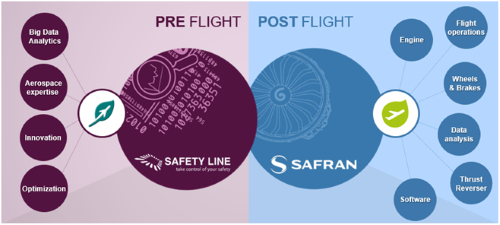Safran and Safety Line team up to give airlines a complete fuel savings solution
15 Jun 2016
{{vendor.Name}}
Connect with Aircraft IT
Sign up to the Aircraft IT twitter feed for all the aviation industry's latest IT related news
Click here to learn about free Membership to Aircraft IT
Safran and Safety Line team up to give airlines a complete fuel savings solution
Paris, France – June 15, 2016
- A complete package combining Safran’s SFCO2 and Safety Line’s OptiClimb solutions • Proven expertise in pre- and post-flight phases
- Fuel consumption reduced up to 8%
Safran and Safety Line, a French startup, have signed a Memorandum of Understanding (MoU) to group their technologies and areas of expertise for the greater benefit of all airlines. The objective is to integrate Safety Line’s innovative OptiClimb solution in the SFCO2 service offering from Safran.
By using this comprehensive solution, airlines can reduce their fuel consumption up to 8%. For a fleet of 20 single-aisle jets, for instance, flying an average of 3,500 hours/year, that would equal annual savings of $6 million, and avoid releasing 42 metric tons carbon dioxide (CO2) into the atmosphere.
Safran’s SFCO2 service addresses airlines’ need to reduce their fuel consumption and emissions by analyzing both operational and maintenance aspects. It combines the expertise of Safran Aircraft Engines as one of the world’s leading aero-engine manufacturers and service providers with Safran Electronics and Defense’s long experience in flight data analysis and big data. Developed in collaboration with the French research institute INRIA, Safety Line’s OptiClimb solution focuses on the climb phase of each flight. Data coming from flight data recorders are analyzed to define the aircraft’s aerodynamic characteristics very precisely and determine the ideal climb profile. This approach can generate savings close to 10% of the climb fuel on each flight.
By combining their services, Safran and Safety Line offer customers a complete solution, tailored to their specific needs. Following an initial analysis phase, including recommendations, airlines will be assigned a dedicated team comprising experts from both companies and state-of-the-art digital tools to measure the improvements and monitor the recommendations implementation.
“Our new joint offering, leveraging the respective areas of expertise of Safran and Safety Line, addresses the need for today’s airlines to reduce fuel consumption, not only to lower their own costs, but also to help protect the environment and allow the sustainable growth of air traffic,” said François Planaud, head of the Services and MRO Division at Safran Aircraft Engines. “Safran is very proud to be teaming up with a dynamic French startup, and to show that a major international corporation knows how to maintain its agility by working with an ecosystem of innovative partners such as Safety Line.”
Pierre Jouniaux, founder and CEO of Safety Line, added, “By deploying innovative solutions we help airlines reduce their carbon footprint immediately, and by working with partners that have the same objective, we will deliver even greater savings.”
Both Safran’s SFCO2 and Safety Line’s OptiClimb have already been chosen by airlines. Ethiopian Airlines recently opted for Safran’s SFCO2 service (see the link), while Transavia France chose OptiClimb after a four-month trial with very satisfactory results (see the link).

SFCO2 bundled with OptiClimb: a service built on a synergy

